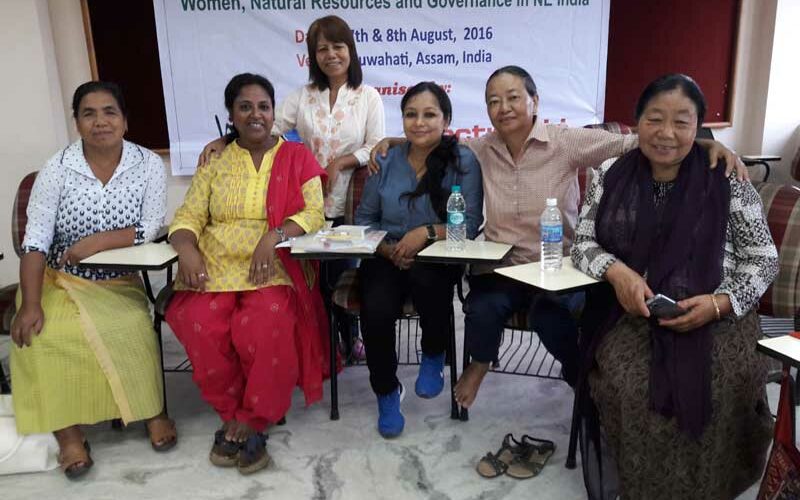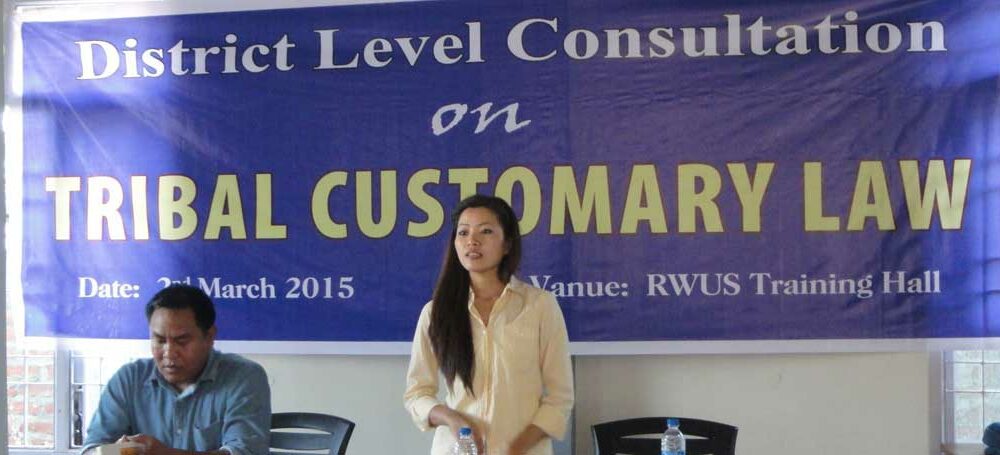North East Consultation on Women, Natural Resources and Governance was held at Guwahati on 7th…
National Consultation On Women And Customary Laws (NE context) In New Delhi
Consultation on Women And Customary Law (NE context) A Short Summary Of The Program Held At
New Delhi, 23rd September 2016
Opening Remarks: Sanjoy Hazarika ( Director , CNESPR)
Customs and Statutory Laws are two separate entities. The status differs in scale and that cannot be mapped. Looking at the customary practices vis a vis laws, one need to look at the question of change. There is a need to look at the trend in the current context vis-a-vis customary practices, such as conflict, migration, natural resources – water, land, forest.
Setting the Context : Mary Beth Sanate ( WiNG and Secy RWUS)
Customs and traditional practice have been a stumbling block for women to further their advancement, particularly in the field of political participation and decision making. Customs and practice are even more severe in rural set up.
While acknowledging the importance of custom and tradition which is intrinsic to identity , there are issues and challenge on the ground . The question is how does one question customs and traditions?
Customs and traditions are not codified and documented . There are also differing perspective and need of the hour is a dialogue process.
The three issues that need to be looked at vis a vis Customary Laws.
- Customary Laws and Property Rights
- Customary Laws and Child Custody
- Customary Laws and decision making / political representation
The objective of the consultation is to improve the existing sturctures/ systems both constitutional and traditional bodies and increase women representation in schedule areas. The consultation is also aimed at deliberations on way forward for participation of women in framing or revivewing such existing traditional systems /laws and redefine/ review customary laws.
Given the existing tension between tradition/ customary laws and constitional statues, this consultation is aimed at deliberations on how to negotiate for space in this complex and complicated set up.
>Customary Laws: Opportunity and challenges for women advancing women leadership – By Sumshot Khullar ( Naga Women Union)
- The case of Lamkang Tribe.
Customs, traditions and practices need not neccesarily be negative. We are not either in favour of doing away with the same. Moreover there are positive aspects of traditions that need to be looked into and strengthened- customs that have been followed and practice since ages. A look at some of the customary practices such as in Lamkang tribe – the naming of a child- wherein the origin and identity of the child’s mother can be traced and thus preserved through the name of the child – where the comunity would automatically know his/her mother’s lineage.
Traditional healing practices- is another important aspect where women have been revered and hold high positions in the community or tribe. The other can be cited of the Morung system – a system where all youth come together for collective learning.
Some of the areas that can enhance women leadership are
- Dialogue process with traditional heads and bodies.
- Need to involve men.
- Need for translating international covenants, laws and other legal instruments into local language for women to understand.
The Challenges lies in decision making, where women were never a member or a participant in these traditional decision bodies, such as tribe apex bodies and organisations. Apart from this is the question of codification of customary laws and its implications that need to be seriously looked into – whether this needed to be codified at all is one thing , another being whether is there is any need at all.
>Customary Laws: Opportunity and Challenges for advancing women leadership – By Linda Chhakchhuak ( Senior Journalist)
Traditional practices and customary laws are enforced by the constitution- under special provision – Article 371 of the Indian constitution. Even Judiciary gives judgements based on customs and traditions. Therefore customs and practice are legitimate and ultimately a ‘legal entity’ enforced by the constitutions.
Regarding leadership and its advancement, north-east women have always been in the forefront as leaders. They are the ones who held the tribefolks together. They are the key member in the family unit – who passes on knowledge from generation to generation. It is a well known fact that women are the key in economic activity. But their contribution to the GDP have never been recognised. This needed to be recognsied for further advancement of their leadership . The concept of women as ‘care giver’ need to change. They are not a mere care giver but protector/defenders of land an its resources. Use of vocabulary need to change. A new political thinking/ concept need to evolve.
Even as women and women groups have come a long way in empowerment, where we see women taking up leadership roles and out in public spaces, the ‘fear’ still remain. This is a major hindrance in women’s fruther advancement. Women still lives in fear in their domestic / private life – an unseen violence still persist. Regarding political particpation and representation , there is no opposition perse. No one stopped women from contesting elections. And we have seen many have aslo come out. But the attitude towards women who have come out of their confines need to be changed.
There is a need to break this domestc wall. For this Domestic Violence Act alone is not enough. For women’s further advance in leadership and decision making , the follwoing needs to be considered.
- Forming support and network of women. Generating resources for women candidates.
- In the matter of reservation, there is a need to be cautious as to who gets the reservation.
>Customary Laws ; opportunity and challenges – By Poukho Stephen ( Lecturer Delhi University)
Customs and customary practice are considered as a bloodline – continuity of leanage, identity, culture, traditions . But today it is found that many customs and practices are no longer relevant in the modern day.
There is need to revive customary laws to be relevant in context and situation.
> Steps to advance women’s political participation :
By. Anamika Deb Roy ( Faculty – CNESPR)
- A case of Meghalaya
In the Matrilineal society such as in Meghalaya, names and identity are bestowed upon the daughters in the family to carry forward the lineage and identity. Most importantly land ownership are pased on to daughters.
As per this traditions and customs, all decisions are taken under the supervsion and directions of the maternal uncle. This has also greatly hampers the political participation as witnessed in poor election turn out, such as in 2003 , where only 21 % female voted, let alone contesting.
A case of AssamWomen are very much part of politics and political movements, such as in Assam there are many women cadres in the underground movement, but they are not seen in the political sphere even as one sees movement leaders enter into electoral politics and many of them elected. But there is hardly / or no women who are very much part of political movements participating in the mainstream political process.There is a need to look at empowerment through legislation and international covenant like CEDAW, UN security council 1325
>Discussions and Sharing>Laws or any legislations/ statutory laws takes time to change/ review or amend. It also has the potential for inviting violence and monopoly – while traditions and customs are dynamic with the potential and scope of improvement or review.
- The issue is – where to draw the line between statutory law and customary laws.
- Is there a need for codification of customary laws?
- Why create a binary with constitution / statutory laws. ?
- On codification of cutomary law, there is a need for clarity on the neccesity and objective of codifying the customary laws and practices.To have a clear distinction of what is regressive and progresssive.
- One danger of codifycation is the vulnerability to fall into bureaucracy ( even 5th and 6th schedule do not clearly define customary laws)
>WRAP UP and FUTURE ACTIONS : led by Helam Haokip – WinG
- Women participation should be encourage and women must be recognised as equal politcal actors.
- Need for structural changes.
- Translations of legislations, international covenants into local language
- Attitudinal changes
- Bring celebrity parliamentarians such as Mary Kom to campaign in Manipur Hill area)
- Reservation is a requirement, given the situation and context. Numbers matters .
- Need to strengthen demand for 33% reservation in north-east India.
- Awareness in interiors areas.
- Dialogue wih traditional and tribe leaders.


